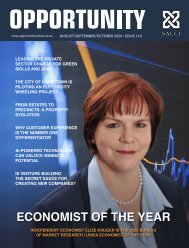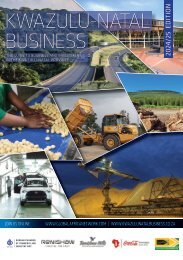South African Business 2018 edition
Welcome to the sixth edition of the South African Business journal. First published in 2011, the publication has established itself as the premier business and investment guide to South Africa, supported by an e-book edition at www.southafricanbusiness.co.za. Regular pages cover all the main economic sectors of the South African economy and give a snapshot of each of the country’s provincial economies. Feature articles on topical issues such as sustainability and African trade provide unique insights, together with an interview with the newly elected chairman of the African Association of Automotive Manufacturers, Mr Thomas Schaefer. Another special feature focusses on an exciting project to transform South Africa’s small harbours and coastal properties. South African Business is complemented by nine regional publications covering the business and investment environment in each of South Africa’s provinces. The e-book editions can be viewed online at www.globalafricanetwork.com. First published in 2011, the publication has established itself as the premier business and investment guide to South Africa, supported by an e-book edition at www.southafricanbusiness.co.za Regular pages cover all the main economic sectors of the South African economy and give a snapshot of each of the country’s provincial economies. Feature articles on topical issues such as sustainability and African trade provide unique insights, together with an interview with the newly elected chairman of the African Association of Automotive Manufacturers, Mr Thomas Schaefer. Another special feature focusses on an exciting project to transform South Africa’s small harbours and coastal properties. South African Business is complemented by nine regional publications covering the business and investment environment in each of South Africa’s provinces. Visit www.globalafricanetwork.com for more business and investment news, opportunities and events.
Welcome to the sixth edition of the South African Business journal. First published in 2011, the publication has established itself as the premier business and investment guide to South Africa, supported by an e-book edition at www.southafricanbusiness.co.za.
Regular pages cover all the main economic sectors of the South African economy and give a snapshot of each of the country’s provincial economies. Feature articles on topical issues such as sustainability and African trade provide unique insights, together with an interview with the newly elected chairman of the African Association of Automotive Manufacturers, Mr Thomas Schaefer. Another special feature focusses on an exciting project to transform South Africa’s small harbours and coastal properties.
South African Business is complemented by nine regional publications covering the business and investment environment in each of South Africa’s provinces. The e-book editions can be viewed online at www.globalafricanetwork.com.
First published in 2011, the publication has established itself as the premier business and investment guide to South Africa, supported by an e-book edition at www.southafricanbusiness.co.za
Regular pages cover all the main economic sectors of the South African economy and give a snapshot of each of the country’s provincial economies. Feature articles on topical issues such as sustainability and African trade provide unique insights, together with an interview with the newly elected chairman of the African Association of Automotive Manufacturers, Mr Thomas Schaefer. Another special feature focusses on an exciting project to transform South Africa’s small harbours and coastal properties.
South African Business is complemented by nine regional publications covering the business and investment environment in each of South Africa’s provinces. Visit www.globalafricanetwork.com for more business and investment news, opportunities and events.
You also want an ePaper? Increase the reach of your titles
YUMPU automatically turns print PDFs into web optimized ePapers that Google loves.
INTERVIEW<br />
Knowledge Pele<br />
Knowledge Pele Managing Director Fumani Mthembi<br />
shares her company’s commitment to using<br />
knowledge for economic transformation.<br />
Fumani Mthembi<br />
BIOGRAPHY<br />
Fumani Mthembi is a founding<br />
member of the Pele Energy<br />
Group and the Managing Director<br />
of its research and development<br />
subsidiary, Knowledge<br />
Pele. She holds an undergraduate<br />
degree in Politics, Philosophy<br />
and Economics from UCT<br />
and an MA Science, Society<br />
and Development from Sussex<br />
University. Under Fumani’s<br />
leadership, Knowledge Pele<br />
has grown into a reputable firm,<br />
leading development thought<br />
and practice, particularly in the<br />
renewable energy sector and<br />
related host communities.<br />
Please explain the concept of linking power and knowledge.<br />
The philosophical premise of our company is that it is our duty to make<br />
a material contribution to the imperative of structural transformation.<br />
We understand that power and knowledge are the bedrock of the<br />
modern social structure. Therefore, through our research division, we<br />
focus on surfacing the knowledge of those who have been historically<br />
silenced to ensure that they can reclaim their power by reassuming<br />
their rightful place as architects of social progress.<br />
Please explain the concept of “community industrialisation”.<br />
Community Industrialisation is one of Knowledge Pele’s instruments<br />
for undoing the historical construct that is the poverty of the majority.<br />
It is common knowledge that the majority live in communities that are<br />
best described as labour reserves, spaces of consumption with limited<br />
production capabilities. Knowledge Pele’s community industrialisation<br />
division is focused on recreating these township, peri-urban and<br />
rural communities into thriving, knowledge-based economies. We do<br />
this by researching the economic development possibilities of these<br />
communities, understanding the types of industries that can emerge<br />
and the related knowledge and skills necessary to sustain them. This<br />
work, along with an articulation of the type of future that communities<br />
seek for themselves, forms what we then identify as the community<br />
industrialisation strategy. We then work with our clients to invest aggressively<br />
in training programmes at the community level, for which<br />
we are SETA-accredited. We structure co-investment vehicles between<br />
industry and communities to build local industries that are both run<br />
and owned by local community members. In the long run our intention<br />
is to build sovereign wealth funds for communities on the basis<br />
of the portfolio of industrial assets that they will own.<br />
Please tell us about your partnership with UCT?<br />
We recognise that our work has policy relevance and therefore our<br />
partnership with UCT is vital for ensuring that we remain in constant<br />
dialogue with academics and policy-makers who share our concerns.<br />
SOUTH AFRICAN BUSINESS <strong>2018</strong><br />
80


















